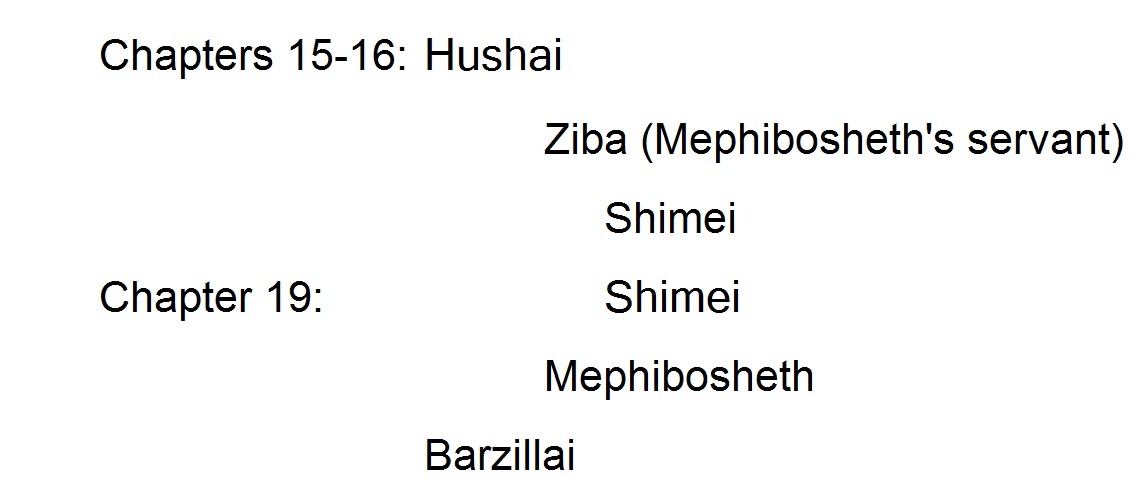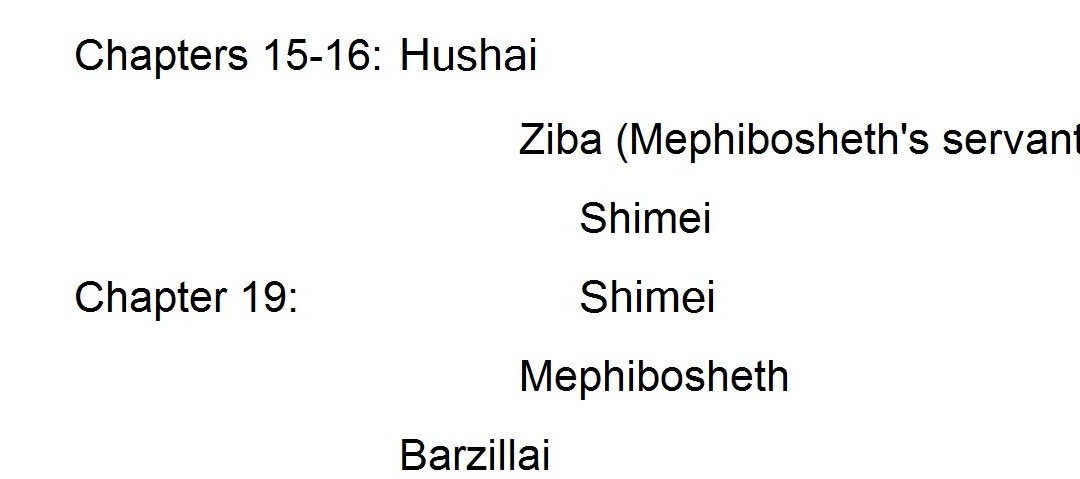The exile and return of David answers in the chiastic structure of Samuel to the exile and return of the ark. Thus the author of Samuel is purposefully comparing King David with the ark. The movement of exile and return is a type of death and resurrection.
David’s exile and return is the exile and return of Israel. Remember that David = Israel. And what happens to David in these chapters and later will happen to Israel. One day the whole nation of Israel will go into exile and later they will return to the land.
Of course, David went EAST. This is always the direction of exile. (Recall Genesis).
He left rather than Absalom “bring down ruin on us and strike the city with the edge of the sword” (2 Sam 15:14). David is concerned for his people. This is an attitude change for King David. Before Nathan the Prophet had confronted David, he did not seem so disturbed with his people dying to cover up his sin with Bathsheba (Uriah the Hittite, the soldiers who died at the same time). Now David is back to his senses remembering the lesson God taught him going up against Saul that he should not have the blood of Israelites on his hands.
2 Sam 15:16 notes that the King and his whole household left, except “the king left ten concubines to keep (guard) the house.” David has left behind a significant number (ten=fullness) of his harem. Remember that YHWH said through Nathan the prophet, “I will raise up evil against you out of your own house. And I will take your wives before your eyes and give them to your neighbor, and he shall lie with your wives in the sight of the sun” (2 Sam 12:11). Thus we are prepared to see Absalom will rape the ten concubines not for sexual pleasure but as a political statement.
David again found support among the Gentiles. And again it is among the the people of Gath (Philistines, where Goliath had lived).
Leithart observes, “Though David’s own son conspired against him and won the hearts of Israel, these Gentiles remained loyal to David and thus were part of the ‘true Israel.’ Similarly, Jesus was opposed by ‘his own’ but accepted by Gentiles, demonstrating that ‘not all Israel are of Israel’” (p.246).
Ittai of Gath’s statement of faith plays on the sound of his own name (similar to “with me”): “As YHWH lives (i.e. this is an oath), and as my lord the king lives, wherever my lord the king shall be, whether for death or for life, there also will your servant be” (2 Sam 15:21). Recall the statement of faith of Ruth. True faith includes loyalty to God’s people – to the true Israel (the true church) of God.
The events of the rest of this chapter then undo the exaltation of David as king. He meets people in the reverse order. Zadok with the ark (remember the ark coming into Jerusalem right before his full exaltation), Hushai the Archite (another Gentile) and then in the next chapter Ziba the servant of Mephiboseth and Shimei another member of Saul’s house. Absalom is the Pharaoh figure and David is Israel fleeing persecution. And in 2 Sam 16:14 they arrived at the Jordan River.
The two people with connections to Saul treat David very differently but to similar ends. The servant of Mephibosheth paid David homage. This servant, Ziba, lied to David and told him that Mephibosheth was hoping to be given the throne of Israel. So David gave Ziba all of Mephibosheth’s things. Shimei, cursed continually and threw stones and dust at David. The words of Genesis are appropriate to recall – ‘I will curse those who curse you and bless those who bless you.’ David says, “It may be that YHWH will look on the wrong done to me, and that YHWH will repay me with good for his cursing today” (2 Sam 16:12).
In the next portion of chapter 16, Absalom will play the role of Reuben. Remember that Jacob/Israel = David. So David’s firstborn would be like Reuben, the firstborn of Jacob/Israel. Reuben slept with his father’s concubine. Now Absalom will sleep with his father’s ten concubines because of Ahithophel’s advice. In both cases the son became “a stench” to their father. Absalom slept with them publicly (everyone knew what was going on in the tent) so that all of Israel would see the shaming of David and see that David was unable to protect his own household and thus the nation.
The next advice that Ahithophel gave Absalom was that he should take 12,000 men of Israel and strike against David immediately. The advice seemed right in the eyes of Absalom and all the elders of Israel. Not to mention that 12,000 is a symbolic number as a multiple of 12 and 1000. Twelve is the number representing the people of God. Thus this will be a contest to determine who the true Israel is – Absalom and the descendants of Israel by blood or David and his Gentile friends. The goal was to kill David, any other casualties are secondary concerns (like David’s orders concerning Uriah the Hittite).
Hushai was able to defeat Ahithophel’s “good” counsel beginning a speech by calling Ahithophel’s counsel, “Not good.” He suggested gathering an army “as the sand by the sea for multitude, and that [Absalom] go to battle in person” (2 Sam 17:11). This bought David time. The plans then had to be relayed to David and his spies, the sons of the priest, were almost caught except that they were hid by a woman. Thus we see a new Rahab and spies situation and Absalom is now like the king of Jericho. When Ahithophel realized his counsel would not be followed the old Judas hanged himself.
In his place of wilderness exile David and his men are given food and water by Gentiles, namely, Shobi, the son of Nahash from Rabbah of the Ammonites (who had taken over from his brother, probably with David’s help) and two others.
David has had time to amass a substantial army and he organized it in a similar way to Israel’s organization in the wilderness by hundreds and thousands. Absalom was going to lead his troops, but the army of David would not let him lead because they realized that David was the target and with him gone they would have to submit to Absalom. David gave orders that Absalom was to be dealt with gently. This is consistent with how David fought his enemies within Israel and how he would want his own son treated. However, Joab did not follow these orders and they killed Absalom. Joab has a knack for doing this.
Moreover, the forest devoured (it “ate”) Absalom’s troops. In exile, David’s troops found food but Absalom’s troops are now becoming food by the forest. This included Absalom. Absalom got caught in a tree. He was riding on his mule and the mule went under the thick branches of a great terebith and his head caught fast in the oak and the mule kept going with Absalom hanging there. The image implied is that his hair, which he was known for and served as his crown and glory, got tangled in the tree branches. He was hanging on a tree, a position of being cursed by God, between heaven and earth and rejected by both.
What chapter 19 does is in the reverse order we saw earlier.
King David pardoned Shimei who acknowledged that he had sinned and asked for David’s forgiveness. Then he learned the truth about why Mephibosheth had not come down (his servant Ziba had gone in his stead, but then lied to David), Mephibosheth was so happy David was back he insisted that Ziba could keep the land. His loyalty was to David and not because of land.
And Barzillai the Gileadite is in the place of Hushai in this structure. Concerning the reason these are parallel, Leithart notes these similarities: “Both were older men of property and wealth who remained utterly loyal to David; neither accompanied David; each was said to be a ‘burden’ to David (2 Sam 15:33; 19:35)” (p.258).
And so we see the exile and return of King David, which points us to the exile (death) and return (resurrection) of Jesus Christ.

Recent Comments